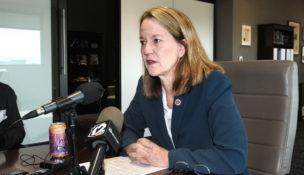Judge rejects effort to strike down voter-approved Proposition 314
Kiera Riley Arizona Capitol Times//October 13, 2025//
Judge rejects effort to strike down voter-approved Proposition 314
Kiera Riley Arizona Capitol Times//October 13, 2025//
Key Points:
-
Judge dismisses challenge to state’s Secure the Border Act
-
Ruling notes key challenged provisions have yet to take effect
-
Advocacy group plaintiffs plan to appeal decision
A judge blocked an attempt from two advocacy organizations to strike down the state’s Secure the Border Act as key provisions of the law have yet to take effect.
Proposition 314, a legislative referral approved by voters in 2024, requires a check on citizenship to determine eligibility for public benefits, levies charges on those who apply with false information, criminalizes the sale of “lethal fentanyl” and deems illegal entry into the country a state crime necessitating enforcement and detention down to the local level.
But, the lawsuit and now the dismissal, come as the provisions on illegal entry remain in limbo. Though the document verification and fentanyl pieces are active, the act, so far as it empowers local police and sheriffs to take up immigration enforcement, remains contingent on similar legislation out of Texas surviving its own legal challenge.
As it stands now, the illegal entry enforcement provision in Texas and Arizona is blocked by a circuit court. In July, the Fifth Circuit Court of Appeals upheld the district court decision to enjoin the law, finding federal law preempts state-level immigration enforcement. But the circuit court agreed to rehear the case, with a hearing tentatively set for early 2026.
In April, Living United for Change in Arizona, or LUCHA, and Arizona Center for Empowerment, two immigrant advocacy organizations, challenged the measure on alleged violations of three state constitutional provisions — the revenue source requirement, the separation of powers doctrine and delegation of legislative authority.
The plaintiffs claim the act lacks details on how the state is to fund enactment, usurps judicial power in defining probable cause, and improperly delegates legislative power by hinging the law’s effective date on the fate of the Texas legislation.
In an uncommon alignment, both Attorney General Kris Mayes and the legislative leaders, Senate President Warren Petersen and House Speaker Steve Montenegro, stepped to the law’s defense.
The two challenged the plaintiffs’ ability to sue in the first place. They moved for dismissal, arguing that the challenged illegal entry provision has yet to take effect and may never, given the circumstances.
And, the Legislature noted the claim of no revenue source was made moot as one of the only direct costs, the fee to access the Systemic Alien Verification for Entitlements Program, or SAVE database, was waived for state and local use.
In a ruling, Judge Michael Valenzuela agreed the currently dormant illegal entry provisions are not ready for a day in court. And because the law has yet to take effect, the organizations cannot assert a “present, existing and actual” controversy.
Valenzuela found the plaintiffs could, however, challenge the “trigger provision,” but ruled the Legislature made no misstep in basing enactment on the outcome of another Legislature’s legal challenge.
“The Court has found infirmities in all counts raised in the Complaint,” Valenzuela wrote.
Senate President Warren Petersen praised the ruling in a statement for “upholding the will of the voters who passed Prop 314 to protect our communities from illegal crossings and fentanyl.”
“Border security is non-negotiable,” Petersen said.
A spokesperson for the attorney general did not respond to a request for comment.
James Barton, attorney for LUCHA and ACE, said the court misstepped in striking down the lawsuit primarily on procedural grounds.
On the revenue source requirement, Barton claims the waiver of a SAVE database fee does not negate the fact that the law mandated expenditures in the first place, and he pointed to potential fiscal impact of eventual enforcement.
“This is a sweeping, massive piece of legislation,” Barton said. “If we’re able to look at some of these things, we’ll probably see what other kinds of expenditures are mandated. It’s not necessarily obvious just by looking at it.”
He pointed to a July 2024 analysis by the Joint Legislative Budget Committee, which anticipated an increase in state and local law enforcement spending on arrests, prosecutions and incarceration.
The Department of Public Safety estimated an annual $3.8 million cost to cover arrest and processing costs, transportation to ports of entry and criminal record checks.
The Arizona Department of Corrections, Rehabilitation and Reentry projected the cost for increased incarceration would grow to $178 million in FY2029, though JLBC did note some reservations on the department’s estimation.
“It’s going to cost millions and millions of dollars. I think it’s plenty ripe for consideration,” Barton said. “I just think the court made a mistake.”
Barton said the plaintiffs will likely appeal the decision.














































